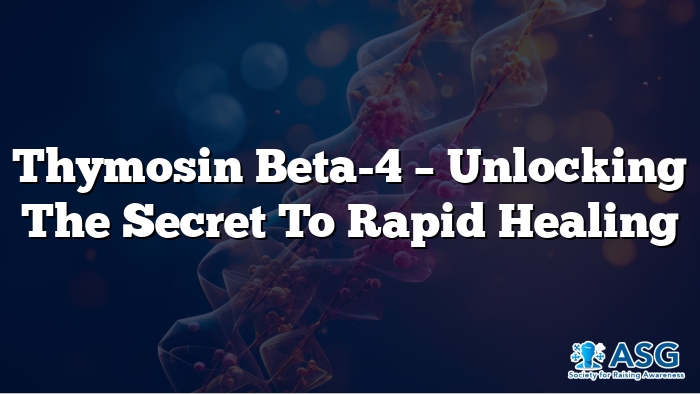Thymosin Beta-4 – Unlocking the Secret to Rapid Healing

Thymosin Beta-4 is a fascinating peptide that has captured the attention of researchers and medical professionals worldwide. This naturally occurring compound, found in various tissues throughout the body, plays a crucial role in cellular regeneration and repair processes. As we delve deeper into the world of peptide sciences, Thymosin Beta-4 stands out for its potential to revolutionize healing and tissue repair.
What is Thymosin Beta-4?
Thymosin Beta-4 is a 43-amino acid peptide that is naturally present in the human body. It is found in high concentrations in blood platelets and plays a vital role in the body's healing processes. This bioactive peptide is involved in cell migration, angiogenesis, and the formation of new blood vessels.
Peptide suppliers and researchers have been studying Thymosin Beta-4 extensively due to its unique properties and potential therapeutic applications. Its ability to promote healing and tissue repair has made it a subject of interest in various fields of medicine.
How Does Thymosin Beta-4 Work in the Body?
Thymosin Beta-4 functions by binding to actin, a protein essential for cell movement. This binding process promotes cell migration and tissue repair. By facilitating the movement of cells to areas of damage or injury, Thymosin Beta-4 accelerates the healing process.
Moreover, this peptide plays a crucial role in angiogenesis – the formation of new blood vessels. This process is vital for wound healing as it ensures that damaged tissues receive an adequate blood supply. The unique mechanisms of Thymosin Beta-4 have made it a focus of numerous peptide clinical trials.
Benefits of Thymosin Beta-4
The benefits of Thymosin Beta-4 are wide-ranging and significant. Its primary advantages lie in the realm of healing and tissue repair. Some of the key benefits include:
1. Accelerated wound healing
2. Enhanced muscle recovery
3. Potential applications in treating heart conditions
4. Skin regeneration and anti-aging properties
5. Reduction of inflammation
These benefits have led to increased interest from peptide clinics and researchers exploring its potential therapeutic applications.
Potential Side Effects of Thymosin Beta-4
While Thymosin Beta-4 is generally considered safe, it's crucial to be aware of potential side effects. Most users experience minimal adverse reactions, but some may encounter:
– Mild

redness or swelling at the injection site
– In rare cases, allergic reactions
Peptide safety is a primary concern for manufacturers and users alike. It's essential to consult a healthcare professional before starting any new treatment involving Thymosin Beta-4 or other peptides.
Thymosin Beta-4 in Wound Healing
One of the most promising applications of Thymosin Beta-4 is in wound healing. This peptide promotes the migration of cells to the wound site, accelerating the healing process. It also stimulates the formation of new blood vessels, ensuring that the wound receives an adequate blood supply.
Peptide sciences research has shown that Thymosin Beta-4 can be particularly valuable in treating chronic wounds and injuries that are resistant to conventional treatments. This has led to increased interest from medical professionals and peptide clinics specializing in wound care.
Thymosin Beta-4 and Muscle Recovery
Athletes and fitness enthusiasts have shown great interest in Thymosin Beta-4 due to its potential to enhance muscle recovery. This peptide reduces inflammation and promotes the repair of damaged muscle fibers, potentially leading to faster recovery times and improved performance.
The ability of Thymosin Beta-4 to promote the formation of new blood vessels also aids in muscle recovery by ensuring that muscles receive an adequate blood supply. This has made it a popular topic of discussion in peptide marketplaces and among sports medicine professionals.
Thymosin Beta-4 in Clinical Trials
Numerous clinical trials are exploring the potential applications of Thymosin Beta-4 in various medical conditions. These studies aim to fully understand its benefits and potential side effects. Preliminary results have been promising, particularly in the areas of wound healing and muscle recovery.
Peptide manufacturers and researchers are closely monitoring these trials, as positive results could lead to new therapeutic applications and increased demand for Thymosin Beta-4 peptide solutions.
Thymosin Beta-4 for Skin Regeneration
The potential of Thymosin Beta-4 in skin regeneration has garnered significant attention in the cosmetic and dermatology fields. This peptide promotes the migration of cells to the skin's surface and aids in the formation of new blood vessels, potentially accelerating the healing process of skin injuries and conditions.
These properties have made Thymosin Beta-4 a subject of interest for peptide wholesalers catering to the skincare industry. Its potential anti-aging effects are particularly exciting, as it may help improve skin elasticity and reduce the appearance of wrinkles.
Thymosin Beta-4 vs. Other Healing Agents
When compared to other healing agents, Thymosin Beta-4 offers several advantages. Its ability to promote cell migration and angiogenesis sets it apart from many conventional treatments. Additionally, it generally has fewer side effects compared to some other healing agents, making it a safer option for many users.
These advantages have led to increased interest from peptide clinics and healthcare professionals looking for effective and safe alternatives to traditional healing agents.
How to Administer Thymosin Beta-4
Thymosin Beta-4 is typically administered via injection. Proper administration is crucial to ensure safe and effective use. It's essential to follow guidelines provided by healthcare professionals or reputable peptide suppliers.
The process often involves peptide reconstitution, where the peptide powder is mixed with sterile water or saline solution. Proper peptide storage is also crucial to maintain the efficacy of the product.
Thymosin Beta-4 Dosage Guidelines
The dosage of Thymosin Beta-4 can vary depending on the condition being treated. It's crucial to consult a healthcare professional for the correct dosage. Typically, the peptide is administered in cycles, with a specific dosage given over a set period.
Peptide customer service representatives from reputable suppliers can often provide general information about dosage, but should always defer to healthcare professionals for specific medical advice.
Thymosin Beta-4 and Inflammation Reduction
One of the key benefits of Thymosin Beta-4 is its anti-inflammatory properties. By promoting the repair of damaged tissues, it can help reduce inflammation in various parts of the body. This makes it a valuable tool in treating conditions characterized by chronic inflammation.
The anti-inflammatory effects of Thymosin Beta-4 have made it a subject of interest for peptide manufacturers and researchers looking for new ways to combat inflammatory conditions.
Thymosin Beta-4 in Veterinary Medicine
The benefits of Thymosin Beta-4 aren't limited to human medicine. It's also finding applications in veterinary care, where it's used to promote healing and tissue repair in animals. This peptide has shown promise in treating injuries and chronic conditions in pets, offering a safe and effective option for promoting healing.
Veterinary peptide clinics are increasingly exploring the use of Thymosin Beta-4 in their treatment protocols, particularly for conditions that are difficult to treat with conventional methods.
Thymosin Beta-4 for Heart Repair
One of the most exciting potential applications of Thymosin Beta-4 is in heart repair. This peptide promotes the formation of new blood vessels, which could help ensure that the heart receives an adequate blood supply. Additionally, it aids in the repair of damaged heart tissues.
These properties have made Thymosin Beta-4 a subject of intense research in cardiology. Peptide sciences researchers are exploring its potential in treating various heart conditions and improving overall heart function.
Thymosin Beta-4 and Anti-Aging Benefits
The potential anti-aging benefits of Thymosin Beta-4 have garnered significant attention in recent years. Its ability to promote the repair of damaged tissues and the formation of new blood vessels could have substantial implications for skin health and overall aging processes.
Peptide marketplaces have seen increased interest in Thymosin Beta-4 products marketed for their potential anti-aging effects. While more research is needed to fully understand these benefits, preliminary results have been promising.
Conclusion
Thymosin Beta-4 represents an exciting frontier in peptide research and therapeutic applications. Its potential to promote healing, reduce inflammation, and aid in tissue repair makes it a versatile tool with numerous possible uses. As research continues and more peptide clinical trials are conducted, we may uncover even more benefits of this remarkable peptide.
However, it's crucial to approach the use of Thymosin Beta-4 with caution and under professional guidance. Peptide safety should always be a top priority, and users should ensure they source their peptides from reputable peptide suppliers who prioritize quality and peptide purity.
As we continue to explore the potential of Thymosin Beta-4 and other bioactive peptides, we may be on the cusp of significant breakthroughs in healing and regenerative medicine. The future of peptide sciences looks bright, and Thymosin Beta-4 is certainly a key player in this exciting field.
Frequently Asked Questions
Is Thymosin Beta-4 legal?
The legality of Thymosin Beta-4 can vary by country and intended use. It's often legal for research purposes but may require a prescription for therapeutic use.
How long does Thymosin Beta-4 last once reconstituted?
Once reconstituted, Thymosin Beta-4 typically has a peptide shelf life of about 30 days when stored properly in a refrigerator.
Can Thymosin Beta-4 be used alongside other peptides?
Yes, Thymosin Beta-4 can often be used in combination with other peptides, but it's crucial to consult a healthcare professional before combining treatments.
| Feature | Details |
|---|---|
| Composition | 43 amino acid peptide |
| Primary Functions | Cell migration, Angiogenesis, Tissue repair |
| Key Benefits | Wound healing, Muscle recovery, Potential heart repair |
| Administration | Typically via injection |
| Safety Profile | Generally considered safe, mild side effects possible |
